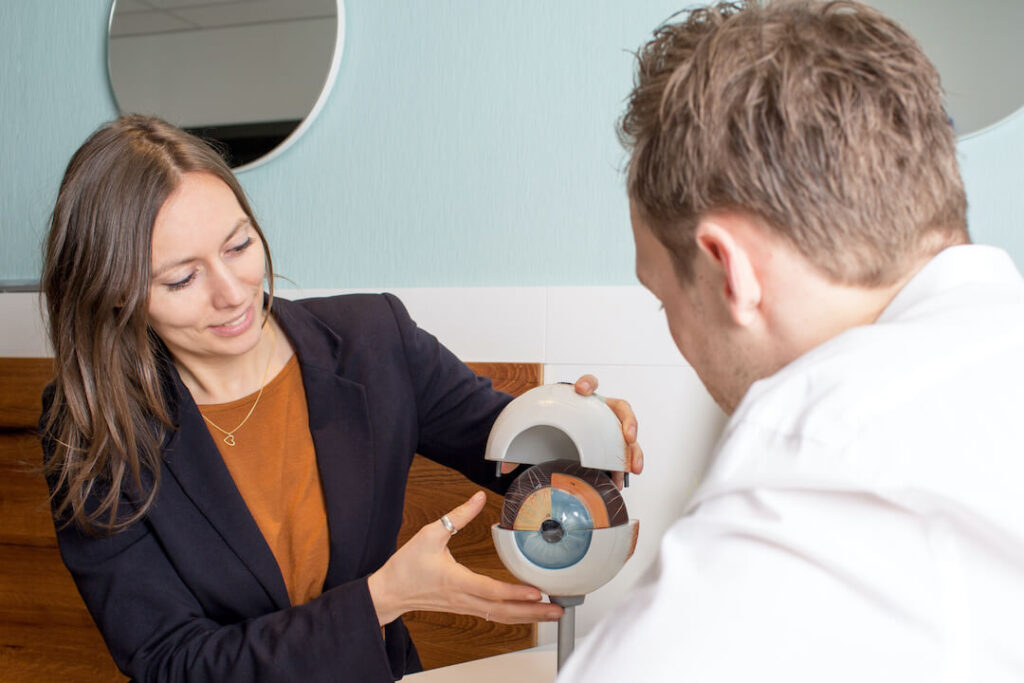We answer the question “Are eyeglasses tax deductible?” and give you options for other cost-saving options!
By understanding the tax deductions you may be eligible for with vision-related expenses, including eyeglasses and other services, it is possible to maximize your medical expense deduction without breaking the bank. Knowing if eyeglasses are a part of those medical procedures that can benefit from these tax savings will help ensure your eyes receive proper care at the right price. So, are eyeglasses tax deductible? Let’s find out!
Want to save on your eye care and eyewear? Explore our coverage options!
Table of Contents
Understanding Eyeglasses Tax Deductibility
Not sure if your eyeglasses are deductible? Let’s go over some of the stipulations

Differentiating between prescription eyewear and non-prescription glasses is essential to maximize tax deductions for medical expenses. To be deductible, eyeglasses must be recommended by an ophthalmologist in order to correct vision issues. Non-prescription ones are mostly worn only as a fashion statement or protection from the sun’s rays. These types of glasses do not have qualifying medical reasons that would make them eligible for deductions. Understanding this distinction can help you reduce your overall tax obligations when it comes time to file taxes on medical expense items such as eyewear prescriptions.
Prescription Eyeglasses vs Non-Prescription Glasses
Prescription eyeglasses are specially designed with lenses that correspond to the exact measurements taken from an eye exam. If they have been prescribed due to a medical need, such as vision correction, these glasses may be eligible for tax deductions on your next filing. On the other hand, regular sunglasses or any type of purchase eyeglasses made of non-prescribed frames cannot qualify for this deduction since it is not considered a medically necessary expense by the IRS.
Medical Reasons for Deductibility
Eyeglasses tax deductions are possible when there’s a legitimate medical need. People who have vision-related issues like astigmatism and hyperopia can get prescription eyeglass frames that qualify for these benefits. To back up the claim, doctors may require proof in the form of prescriptions, invoices, or receipts to show evidence of this necessity. Any other relevant record/documentation must be kept readily accessible just in case it is needed later for claiming your deduction rewards from taxes paid on such glasses purchases.
Navigating the 7.5% AGI Threshold
Now that we understand why some eyeglasses are tax deductible let’s get into the specific details

To make the most of medical expense deductions, it is important to understand how adjusted gross income (AGI) applies to this threshold set by the Internal Revenue Service (IRS). This 7.5% AGI cutoff indicates that only those expenses that surpass 7.5 of your adjusted earnings can be deducted from tax payments. In other words, if you wish to benefit from these savings on medical costs and fees, then they must exceed a specified percentage of your overall gross income. Knowing exactly what qualifies for such expenditure deductions and determining one’s respective total income are vital components in taking advantage of available benefits provided through IRS regulations.
Calculating Your AGI
Adjusted Gross Income (AGI) is the basis of your federal tax calculation and is determined by subtracting applicable deductions or adjustments from gross income, which consists of wages, self-employment income, taxable interest dividends, capital gains, rental income, and retirement income.
It should be noted that non-taxable earnings are not taken into consideration when determining AGI. Correctly calculating your AGI can help lower taxes as well as ascertain medical expense deduction eligibility. Through this approach to financial taxation, individuals may experience a decrease in their overall tax burden while enjoying more favorable outcomes under IRS regulations on total income sources minus 7.5 adjusted deductions.
Tracking and Documenting Expenses
Organizing and documenting your medical payments and out-of-pocket expenses is critical to optimizing deductions for these costs when it comes time to file taxes. To do this, first, create a folder or envelope that solely holds all relevant paperwork pertaining to such expenditures as doctor’s visits, glasses prescriptions, and other relevant documents. Then, Subdivide the materials based on each expense type before recording information like the date purchased/visited by the physician along with the dollar amount in either an electronic spreadsheet document or written form. This will help accurately tally up total documented medical-related costs for possible deduction qualification purposes while also providing necessary evidence should there be any audit-required confirmations.
Contact Lenses and Related Expenses
We answered, “are eyeglasses tax deductible?” Now it’s time to take a look at contact lenses
Tax deductions can be applied to contact lenses, related materials, and upkeep costs like saline solutions and cleaning supplies. Expenses such as medical and dental expenses are eligible for tax deductibles, which could potentially help lessen the burden of taxes owed.
Eligible Contact Lens Expenses
You can include the costs of contact lenses, contact lens cleaners, and saline solutions in your medical expense deductions with the IRS. Expenses associated with these items are eligible to be deducted when filing taxes. Contact lens expenses form part of the deductible medical expenditure that is allowed by IRS regulations.
When it comes to claiming deductions on contact lenses, providing proper documentation is essential. Be sure to collect all documentation related to your contacts, just like we went over with eyeglasses.
Eye Exams, Surgeries, and Vision Insurance Premiums
In addition to tax-deductible eyeglasses, there are a lot of other ways that you get the care you need at the right price

It is important to be aware of tax deductions available for vision-related expenses—not only for eyeglasses and contact lenses—but also for eye exams. This can help you save money on any other medical procedures and care costs associated with your sight. Insurance premiums related to vision problems may also qualify for a deduction, which will assist in reducing the cost of health care expenditure, including eyesight maintenance.
Deductible Eye Care Services
Taxpayers can take advantage of deductions by claiming their vision care expenditures, such as eye exams and surgeries like LASIK, on their tax returns. Doing so could reduce total liabilities while ensuring they gain the most possible reductions for eye care needs that are tax deductible only. Those costs that qualify for a medical deduction may be exempt from taxation entirely!
Vision Insurance Premiums
Taxpayers may be able to deduct vision insurance premiums as part of their total medical expenses on their tax return. Only the costs that are not reimbursed by any other means can be used in calculating this deduction. Knowing exactly what each medical payment is eligible for a deduction when filing will ensure accuracy and allow individuals to receive maximum benefits from these deductions.
How to Claim Eyeglasses as a Tax Deduction
Make sure you are able to take advantage of tax-deductible eyeglasses by correctly completing all paperwork
To maximize the tax benefits of eyeglasses and related expenses, it is necessary to prepare correctly when filing your return. This will necessitate filling in the applicable forms, retaining evidence of applicable receipts, such as bills or receipts, and ensuring all data provided is precise; these steps must be taken for a successful claim on deductions.
Filling Out Schedule A
To save on taxes by claiming deductions for eyeglasses and other medical expenses, fill out Schedule A (Form 1040) as part of your tax return. This itemized form lists qualifying deductions such as those related to state and local taxes, mortgage interest paid during the year, charitable contributions made throughout the tax year during the filing period, or any applicable medical bills incurred in that same span.
Ensure accuracy when providing details regarding your eyeglass purchase date and amount spent. It is integral to obtaining maximum benefit from these accepted expense write-offs on a federal level. Also, be sure to include all relevant information surrounding this expenditure so that it passes scrutiny upon submission with the rest of your claimable items listed under Itemized Deductions found on Schedule A (1040).
By completing Form 1040 correctly, you can potentially decrease what would otherwise have been accounted for financially within taxation guidelines. Subsequently, making more funds available come end-of-year filing season!
Utilizing FSA and HSA Accounts for Vision Care
Another way you can save on your vision care is by using your FSA or HSA
Utilizing Flexible Spending Accounts (FSA) and Health Savings Accounts (HSA) can help you get the most out of your tax savings on vision care. Both accounts allow for qualified medical expenses to be paid with pre-tax dollars, meaning less money owed at the end of the year in taxes. Understanding all these benefits and eligible expenses will give even more financial leverage when it comes to covering costs related to eyesight upkeep.
Advantages of FSA and HSA
Taking advantage of a Flexible Spending Account (FSA) and Health Savings Account (HSA) for medical expenses, such as vision care, can lead to tax savings. Both accounts allow individuals the opportunity to use pre-tax dollars when it comes time to pay for eligible health costs, including eye care needs. This means that less taxable income is reported overall while still satisfying any required spending on healthcare-related items.
Maximizing these financial benefits ensures your tax-free vision requirements are met in an efficient way, all while saving money come tax season!
Eligible Vision Care Expenses
In order to make the most of tax savings opportunities, it’s beneficial for one to be aware of eye doctor and vision care expenses, which are eligible for deductions through FSA and HSA accounts. This may include items such as eye exams, prescription sunglasses, contact lenses, or laser eye surgery. Planning out a budget accordingly allows an individual to utilize these potential discounts in their favor.
Frequently Asked Questions
Are Eyeglasses Tax Deductible?
Prescription eyeglasses are classified as a medical expense and can be declared on your taxes under itemized deductions. This means added sales tax and that business owners can use glasses costs to write off in their tax returns.
What medical expenses are not tax deductible?
Health Insurance Costs, nonprescription drugs, and other general health purchases such as vitamins, diet food, and health club dues are not tax-deductible medical expenses.
Additionally, the IRS generally disallows the cost of cosmetic procedures.
Is it worth claiming medical expenses on taxes?
Taxpayers can potentially save money if they itemize their deductions and the medical costs are higher than the standard deduction. This may help to minimize your taxable income and consequently decrease taxes that need to be paid since expenses must abide by IRS guidelines for it to count towards a reduced total on tax day.
Can you deduct vision premiums from taxes?
If you itemize your deductions, medical and vision expenses that exceed 7.5% of your adjusted gross income can be listed as a tax-deductible medical expenses. Whether or not vision premiums are eligible for tax deduction varies depending on the state regulations in question.
Are prescription sunglasses tax deductible?
Prescription sunglasses are eligible for tax deductions because they can be classified as medical necessities to address vision-related issues.
By staying organized with your medical care receipts and bills, taking advantage of flexible spending accounts (FSA) or health savings accounts (HSA), as well as understanding the tax deductions associated with eyeglasses and vision care expenses, you can reduce your overall medical expense taxation. By carefully managing these costs appropriately, it’s possible to maintain healthy eyesight while still saving money on taxes in the process.
If you are looking for even more ways to save money on your yearly eye care or on a new pair of glasses, check out Linneo’s enrollment options! Simply select your state to view all available coverage options!

